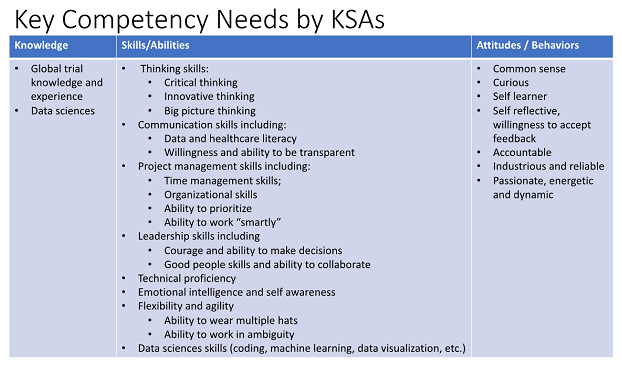Talent Wars: How To Develop A Competent Clinical Research Workforce In A Competitive Environment
By Beth Harper, Association of Clinical Research Professionals (ACRP), and William (Bill) Gluck, Durham Technical Community College
 A booming economy brings opportunities, and the biotech industry is booming. But with that comes challenges, particularly with regard to finding qualified candidates to fill the growing number of jobs. This has brought new meaning to the phrase “talent wars,” which has been bubbling at the surface for over a decade but which seems to have reached a fever pitch this past year.1 Case in point: Some estimates suggest there are well over 250 biotech companies in Cambridge, MA, alone.2 One colleague I met recently from the Boston area recounted a recent experience where, within five weeks of starting a new job, she received some 10 calls from recruiters about other opportunities in the area. Enticing candidates with lucrative benefits packages and promotions to job hop every few months is not a sustainable strategy for building capacity in the workforce. Nor is recycling the same pool of candidates who, while experienced, may not necessarily be the right candidate or a good cultural fit for the organization.
A booming economy brings opportunities, and the biotech industry is booming. But with that comes challenges, particularly with regard to finding qualified candidates to fill the growing number of jobs. This has brought new meaning to the phrase “talent wars,” which has been bubbling at the surface for over a decade but which seems to have reached a fever pitch this past year.1 Case in point: Some estimates suggest there are well over 250 biotech companies in Cambridge, MA, alone.2 One colleague I met recently from the Boston area recounted a recent experience where, within five weeks of starting a new job, she received some 10 calls from recruiters about other opportunities in the area. Enticing candidates with lucrative benefits packages and promotions to job hop every few months is not a sustainable strategy for building capacity in the workforce. Nor is recycling the same pool of candidates who, while experienced, may not necessarily be the right candidate or a good cultural fit for the organization.
At this fall’s Halloran CORE Forum, we had the distinct pleasure of co-facilitating a workshop on the War for Talent, drawing in particular on Bill’s experience during the last decade dedicated to building the workforce of the future. In the following conversation, we share some highlights from our workshop on creating a competent workforce.
To set the stage, it’s worth revisiting what we mean by competence. One favorite is a simple equation that defines competence as a function of Knowledge (K), plus Skills/Abilities (S), plus Job Attitude (A) that is reflected in job behavior; in other words, something that can be observed, measured, and evaluated.3 During a rapid-fire brainstorming session, our workshop participants of industry executives defined the core KSAs or competency gaps they are facing in the workforce:

Figure 1: Compilation of competency needs generated during a Talent Wars Workshop conducted by the authors with industry executives attending the Halloran CORE Forum – September 2018
Beth Harper: Bill, what struck you most when we compiled this list of KSAs?
Bill Gluck: The thing that was a bit of a surprise is that when we asked about core competency needs, with the exception of the data and healthcare literacy and project management/time management skills, the items the group were most interested in were soft skill-related. In many cases, these are behavioral, and while concepts of these can be taught, they are largely reflective of a person’s personality.
Harper: This begs the question of what type of personality trait assessments could be used to uncover these more innate personality attributes as part of a candidate application process. This is something worth exploring in future workshops and workforce related research.
Gluck: In addition, in terms of the gaps within the respective companies, I see this as a real need and desire for team leaders. We have talent in the trenches, but who will rise and, whether it is on a study-by-study basis or a much broader scale, take the initiative and be a leader? Everyone wants to be the leader but often without the accountability of leading. The one trait not listed (although the “courage to make decisions” could be the same thing) is “confidence.”
Harper: I was struck by this as well and, in fact, wrote about this specific issue in my last article.4 While I know we can’t explicitly teach confidence-building, what are ways that you are addressing some of the competency requirements or gaps in your program at Durham Tech?
Gluck: While there are, I believe, some programs that do teach the core foundational knowledge needed, the successful student/young professional will have an exponentially better opportunity to be successful if they combine the book learning with hands-on experience gained through an internship or some sort of fieldwork.
College-level programs offering clinical research coursework, especially those offering associate’s and bachelor’s degrees, will have some sort of fieldwork or internship requirements as part of the degree coursework. Institutions work with local industry employers to allow students to experience life in the workplace environment, where they must translate what they have learned in the classroom to everyday practice. Employers, too, can benefit, as they can assess and guide the program content to best suit their needs and through the internship program evaluate their next new hires. It is a win-win-win scenario for the college programs, their students, and the clinical research employers, whether they are sponsoring organizations, CROs, or vendors.
Harper: One of the most interesting parts of our workshop was the discussion about good (staff) recruitment practices (GRPs).6 It wasn’t all that surprising that initially the group shared their more traditional methods for finding talent. You uncovered and suggested some alternative and creative approaches.
Gluck: Indeed. Everyone is looking for the same person/people, and they are not only at “war” for the talent but also for the recruiters that traditionally bring the talent to them! Sure, everyone noted that they will look to recent graduates, but they really do not do much beyond that. What seemed to resonate with the CORE attendees was the thought that they could have a voice in how student programs were set up. Some of the things we discussed were:
Work with your local colleges and universities. There are now over 100 academic programs in the U.S. specializing in clinical research (for a partial listing of these colleges and universities, visit http://www.coapcr.org/membership/membership-directory/):
- There are opportunities to set up or influence content taught that will best meet the needs of employers.
- See if the college program has an advisory board and whether local employers can sit on the respective boards … be active.
Work with the state organizations. In North Carolina, the North Carolina Biotechnology Center facilitates an initiative to bring industry and academia together to better serve students and retain well-prepared talent within the state as the future workforce. Mass Bio and the Mass Life Science Institute are doing something similar. I definitely encourage the industry to get involved in all these initiatives.
Harper: I couldn’t agree more. We have to invest and nurture the growth and development of the future workforce and can’t rely on recycling the existing talent pool. Academic programs and state organizations are great ways to identify new talent. That’s why at ACRP we’re really excited about our new initiative, Partners in Workforce Advancement (PWA), which will be focusing on a campaign to build awareness of clinical research as a career option.7 That said, beyond the KSAs they learn in school, how do we bridge the experience gap and get students opportunities to do internships and apprenticeships so they get that real-world experience? I know there was a lot of interest in this topic during our session, but how do you recommend organizations go about this, or what should they consider in setting up these programs?
Gluck: We found that most, if not all, companies were receptive to accepting interns. This does take time and planning, but there is also a real benefit — a well-trained and prepared new employee that hits the ground running. In terms of whether interns can/should get paid, pretty much everyone was willing to pay interns — all agreed that this is a good investment.
Setting up internship programs is a fairly straightforward process, especially in our industry, where sponsors and CROs often work together. The greatest challenge is the generation of an affiliation agreement between the employer sites and the college programs. The college programs will need to make sure that each prospective intern meets the employer’s core requirements, background checks, drug screens, etc., and that the college provides liability insurance for the students placed with employers. Getting these agreements typically takes the longest amount of time.
Once in place, the college programs and employers (internship sites) will agree on what types of skills and environment (day-to-day tasks/activities) both the students and sites will benefit from. Having clear and consistent communications, including a checklist of the skills, behaviors, and expectations of both the students and the sites is essential. The students must approach the internship experience as if it is a job (or at the very least an extended job interview) and the site must approach the experience and critically evaluate the students’ skills and in some cases teach new skills when appropriate. Done effectively, the cooperative and shared experience will benefit both site and student, as the site can begin to mold its next new employees with the skills to hit the ground running and use the internship experience as part of its onboarding process, which will save money, effort, and time.
We would like to thank and acknowledge all the workshop participants for so eagerly and willingly sharing their insights. We look forward to continuing the conversation and welcome your ideas as we continue our quest to enhance the clinical research workforce.
References:
- Trending 2017: Talent War. Retrieved from: https://www.pharmavoice.com/article/2016-11-talent-war/
- The Biotech Boom: By the Numbers. Retrieved from: http://www.wbur.org/commonhealth/2018/06/04/biotech-kendall-companies-jobs-office-space
- Competency based HR Management. Retrieved from: https://www.slideshare.net/ZainiIthnin1/competency-based-hr-management-18080989
- From Cowardly Lions To Courageous Decision Makers: What ClinOps Needs Now. Retrieved from: https://www.clinicalleader.com/doc/from-cowardly-lions-to-courageous-decision-makers-what-clinops-needs-now-0001
- What Talent Management Can Do to Shape Next-Generation Pharma Leaders. Retrieved from: https://www.mckinsey.com/industries/pharmaceuticals-and-medical-products/our-insights/what-talent-management-can-do-to-shape-next-generation-pharma-leaders
- Talent War in the Biomedical Sciences Sector. Retrieved from: https://www.scientecsearch.com/employerresources/talent-war-in-the-biomedical-sciences-sectors-64110111941
- https://www.acrpnet.org/2018/08/23/groundbreaking-initiative-aims-to-expand-clinical-research-workforce/
About The Authors:
 Beth Harper is the president of Clinical Performance Partners, Inc., a clinical research consulting firm specializing in enrollment and site performance management. Harper also is the workforce innovation officer for the Association of Clinical Research Professionals (ACRP). She has passionately pursued solutions for optimizing clinical trials and educating clinical research professionals for over three decades. Harper is an adjunct assistant professor at George Washington University who has published and presented extensively in the areas of protocol optimization, study feasibility, site selection, patient recruitment, and sponsor-site relationship management. She serves on the CISCRP Advisory Board and the Clinical Leader Editorial Advisory Board, among other industry volunteer activities. She can be reached at 817-946-4728, bharper@clinicalperformancepartners.com, or bharper@acrpnet.org.
Beth Harper is the president of Clinical Performance Partners, Inc., a clinical research consulting firm specializing in enrollment and site performance management. Harper also is the workforce innovation officer for the Association of Clinical Research Professionals (ACRP). She has passionately pursued solutions for optimizing clinical trials and educating clinical research professionals for over three decades. Harper is an adjunct assistant professor at George Washington University who has published and presented extensively in the areas of protocol optimization, study feasibility, site selection, patient recruitment, and sponsor-site relationship management. She serves on the CISCRP Advisory Board and the Clinical Leader Editorial Advisory Board, among other industry volunteer activities. She can be reached at 817-946-4728, bharper@clinicalperformancepartners.com, or bharper@acrpnet.org.
 Bill Gluck, Ph.D., is currently the program director for the Clinical Trials Research and Medical Product Safety/Pharmacovigilance programs at Durham Technical Community College and is an adjunct professor in the Clinical Research Department at Campbell University. He is also the president of the Consortium of Academic Programs in Clinical Research (CoAPCR) and a commissioner on the Commission on Accreditation of Allied Health Education Programs. He is passionate about education, workforce development, and the effective and appropriate use of technology to enhance clinical research and to prepare younger professionals for careers in the industry. He can be reached at gluckw@durhamtech.edu or billgluck1@gmail.com.
Bill Gluck, Ph.D., is currently the program director for the Clinical Trials Research and Medical Product Safety/Pharmacovigilance programs at Durham Technical Community College and is an adjunct professor in the Clinical Research Department at Campbell University. He is also the president of the Consortium of Academic Programs in Clinical Research (CoAPCR) and a commissioner on the Commission on Accreditation of Allied Health Education Programs. He is passionate about education, workforce development, and the effective and appropriate use of technology to enhance clinical research and to prepare younger professionals for careers in the industry. He can be reached at gluckw@durhamtech.edu or billgluck1@gmail.com.
